Coordinación
Una coordinación sólida puede evitar vacíos y duplicaciones en las respuestas humanitarias, así como garantizar que los PTM complementen otros tipos de asistencia. Sin embargo, el informe del «Estado Global de los Programas de Transferencias Monetarias» de la CALP Network muestra que la coordinación de la asistencia en efectivo es vista como débil y ad hoc, y que esto está teniendo graves repercusiones operativas.
Los donantes, las ONG y los líderes de los grupos de trabajo de transferencias monetarias (GTM) han pedido claridad sobre tres temas principales relacionados con la coordinación de la asistencia en efectivo:
- Quién debe ser responsable de asegurar una coordinación eficaz de la asistencia en efectivo;
- Cuál es la función y el mandato de los grupos de trabajo de transferencias monetarias, incluso en relación con las transferencias monetarias multipropósito;
- Cómo se debe dotar de recursos a la coordinación de asistencia en efectivo.
Tenemos que basarnos urgentemente en lo que funciona y proporcionar claridad a nivel mundial sobre las preguntas arriba mencionadas, adaptándonos a los diferentes contextos. Hace mucho tiempo que se deberían haber tomado decisiones claras basadas en necesidades operativas y no en la política de las agencias.
Prioridades actuales
El objetivo de la CALP Network es contribuir a seguir progresando en este tema en tres niveles: apoyar a los grupos de trabajo de transferencias monetarias a nivel regional; contribuir a soluciones prácticas para la coordinación de la asistencia en efectivo a nivel mundial; y convocar una discusión basada en la evidencia sobre temas clave, destacando puntos de decisión críticos y oportunidades de progreso.
Contenido destacado

Cash Coordination Tip Sheet
Guidelines and Tools
This tip sheet sets out established best practice, key guidance and resources for all aspects of cash coordination, intended as a clear, accessible and action-oriented guide for those engaged in coordination of cash and voucher assistance (CVA) at the field level.

Introducing the Cash Coordination Tip Sheet
Webinar
The CALP Network has developed a tipsheet setting out established best practice and key guidance and resources for all aspects of cash coordination, intended as a clear, accessible and action-oriented guide for those engaged in coordination of cash and voucher assistance at the field level.

Cash Coordination: A proposal from members in MENA
Blog Post
Earlier this year the CALP Network undertook regional consultations to explore options for cash coordination. This blog lays out recommendations from participants from the Middle East and North Africa who sketched out what cash coordination, and coordination more broadly, could look like in future to support a more effective, efficient and accountable response.
Últimos recursos
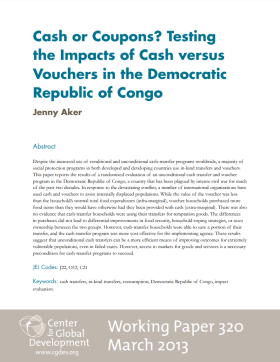
Cash or Coupons? Testing the impacts of cash transfers versus vouchers in the Democratic Republic of Congo
Report
Despite the increased use of conditional and unconditional cash-transfer programs worldwide, a majority of social protection programs in both developed and developing countries use in-kind transfers and vouchers. This paper reports the results of a randomized evaluation of an unconditional cash transfer...
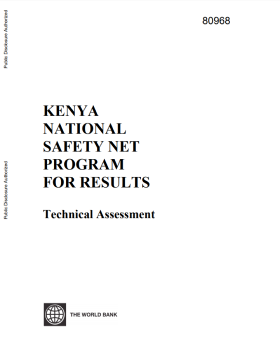
Technical Assessment of the Kenya National Safety Net Program for Results
Report
One of the priorities outlined in the National Social Protection Policy (NSPP) in Kenya, is the government’s ambition to enhance social assistance by developing the necessary institutions and strengthening operational systems while expanding the coverage of such programmes. To help realise this policy...

Predicting the Cost and Impact of Cash Transfer Programmes: The power of microsimulation tools
Policy paper
Oxford Policy Management has recently published a briefing note on using a micro-simulation tool to predict the cost and impact of cash transfer programmes. Cash transfers to households are becoming an increasingly common policy instrument for reducing poverty in some countries of sub-Saharan Africa. This...
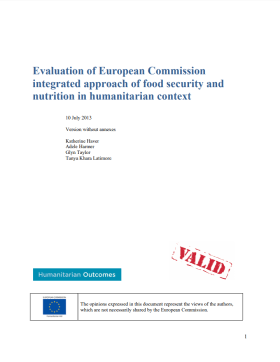
Evaluation of European Commission Integrated Approach of Food Security and Nutrition in Humanitarian Context
Report
The present evaluation was commissioned to assess DG ECHO’s operational capacity to fund integrated food security and nutrition operations in line with the Humanitarian Food Assistance Communication (2010) and related policies. It asks whether DG ECHO-funded food assistance supports, or perhaps hinders,...
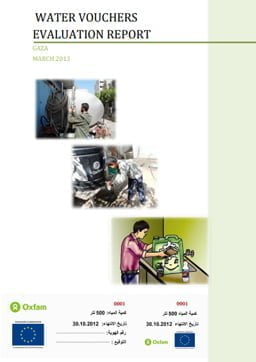
Water Vouchers Evaluation Report, Gaza 2013
Report
A participatory assessment on disaster risk reduction (DRR) was undertaken in GAZA governorate in 2011, OXFAM being the lead agency within the WASH cluster emergency response and preparedness in this area. Three vulnerable neighbourhoods (AL MALALHA, AL MOGRAGHA and AL ZARGA), were identified and an...

Building Women’s Economic and Social Empowerment Through Enterprise: An experimental assessment of the Women’s Income Generating Support (WINGS) program in Uganda
Report
Investing in women is said to be a key to development. Educate her, buy her a cow or goat, or help her start a business and great things will follow: sustained increases in income, greater empowerment and social inclusion, health and education for the children, and (especially in war-affected regions)...
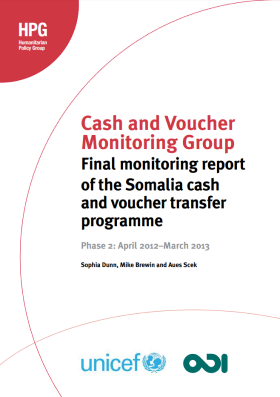
Final Monitoring Report of the Somalia Cash and Voucher Transfer Programme
Report
This report presents the findings of Phase 2 of a monitoring exercise of the Cash and Voucher Monitoring Group (CVMG), a unique partnership involving non-governmental organisations (NGOs) providing cash-based interventions in response to famine and humanitarian emergencies in South Central Somalia. It...
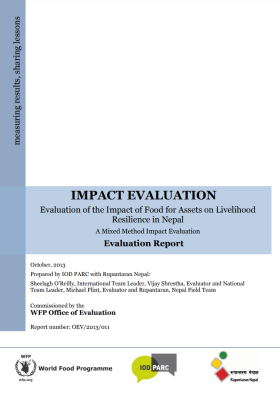
Impact Evaluation: Evaluation of the impact of food for assets on livelihood resilience in Nepal
Report
This evaluation, conducted by an independent team between January and July 2013, assessed the outcomes and impacts of the food-for-assets (FFA) components of two WFP programmes in Nepal: country programme (CP) 100930 (2002–2007) and protracted relief and recovery operation (PRRO) 106760 (2007–2010)....
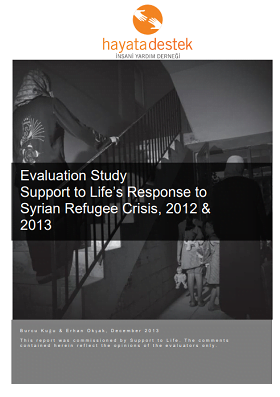
Evaluation Study Support to Life’s Response to Syrian Refugee Crisis, 2012 & 2013
Report
This report is part of enhancing Support to Life’s organisational learning on its Syrian Refugee Programme in Turkey. The specific objective of the evaluation is to present the findings on the achievements, quality and overall impact of Support to Life’s humanitarian response of the Syrian refugee...
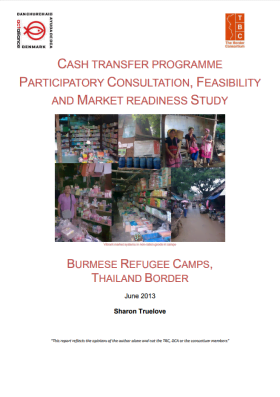
Cash Transfer Programme Participatory Consultation, Feasibility and Market Readiness Study: Burmese refugee camps, Thailand border
Report
This report is a participatory consultation, cash feasibility and market readiness study of the Burmese refugee camps on the Thailand border. It is a rapid, snap shot guide as to whether the conditions in two contrasting camps out of the full nine camps are conducive to a switch from the current ration...
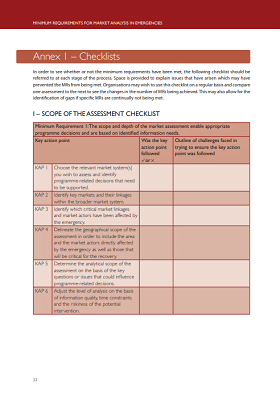
Minimum Requirements For Market Analysis In Emergencies: Annex 1 – Checklists
Report
In order to see whether or not the minimum requirements have been met, the following checklist should be referred to at each stage of the process. Space is provided to explain issues that have arisen which may have
prevented the MRs from being met. Organisations may wish to use this checklist on a regular...
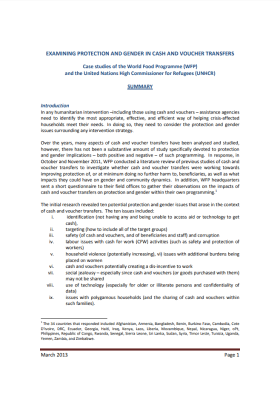
Examining Protection and Gender in Cash and Voucher Transfers – Summary
Report
In any humanitarian intervention – including those using cash and vouchers – assistance agencies need to identify the most appropriate, effective, and efficient way of helping crisis-affected households meet their needs. In doing so, they need to consider the protection and gender issues surrounding...

Comparative Review of Market Assessments Methods, Tools, Approaches and Findings
Guidelines and Tools
Against a backdrop of climate change, global economic crises and commodity market volatility, food security experts are increasingly interested in deepening their understanding of how markets work. In 2011, the the CALP Network commissioned this study, which aimed to assess how we are currently analysing...

Protecting Beneficiary Privacy: Principles and Operational Standards for the Secure Use of Personal Data in Cash and e-transfer Programmes
Guidelines and Tools
The use of electronic transfers (e-transfers) in cash transfer programming has grown in the humanitarian sector and is increasingly recognised as an effective and efficient intervention in certain emergency contexts. Following recommendations made by a CALP research in 2011 on e-transfers ‘New...
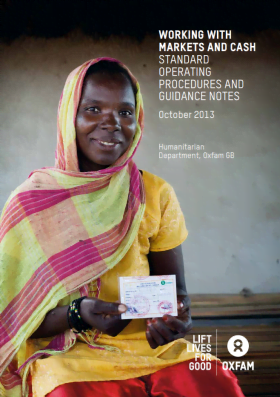
Working with Markets and Cash – Standard operating procedures and guidance notes
Guidelines and Tools
The purpose of these standard operating procedures (SOPs) is to provide humanitarian teams, across the different departments and sectors, a structured overview of how CTPs can be designed and implemented within Oxfam’s humanitarian programmes. It is meant to improve the working of a team by giving...

The Effect of Cash, Vouchers and Food Transfers on Intimate Partner Violence: Evidence from a randomized experiment in Northern Ecuador
Report
Despite the pervasive and far reaching consequences of intimate partner violence (IPV), there is little conclusive evidence on policy instruments to reduce or prevent violence. Using a randomized experiment in Northern Ecuador, this study provides evidence on whether cash, vouchers and food transfers...

Gatekeepers in Mogadishu: Research Consultancy
Report
Since 2011 the Somalia Cash Consortium has been implementing large-scale unconditional cash transfers (UCTs) under the Food Assistance to Vulnerable Households in South Central Somalia. Members of the Consortium have been confronted with the challenge of having to negotiate security and access to IDP...
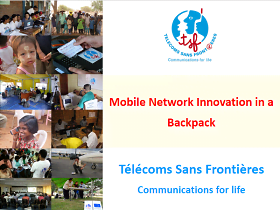
Mobile Network Innovation in a Backpack
Report
Our Core Activities – Rapid response telecommunications centres – Humanitarian calling operations (HCO) – free calls for civilians – Building local capacity for disaster preparedness – Bridging the digital divide with long-term community centers
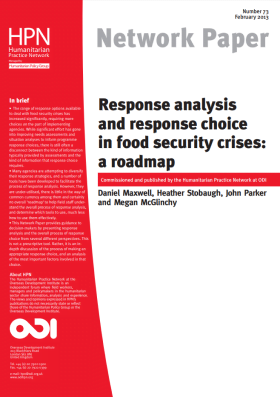
Response Analysis and Response Choice in Food Security Crises: A roadmap
Guidelines and Tools
The term ‘response analysis’ implies that response choices are made solely on the basis of evidence and analysis. However, many factors contribute to how agencies select a response, and ‘response choice’ does not always involve an evidence-based, analytical process. Recent research by The...

Livelihood Coping and Recovery from Disaster: The case of coastal Bangladesh
Report
Bangladesh has a long history of coping with and recovery from disasters. Although climate extremes are increasingly taking huge tolls especially in the southwestern part of the country, households are resisting the negative outcomes of these events eventually. This research explores the livelihood...